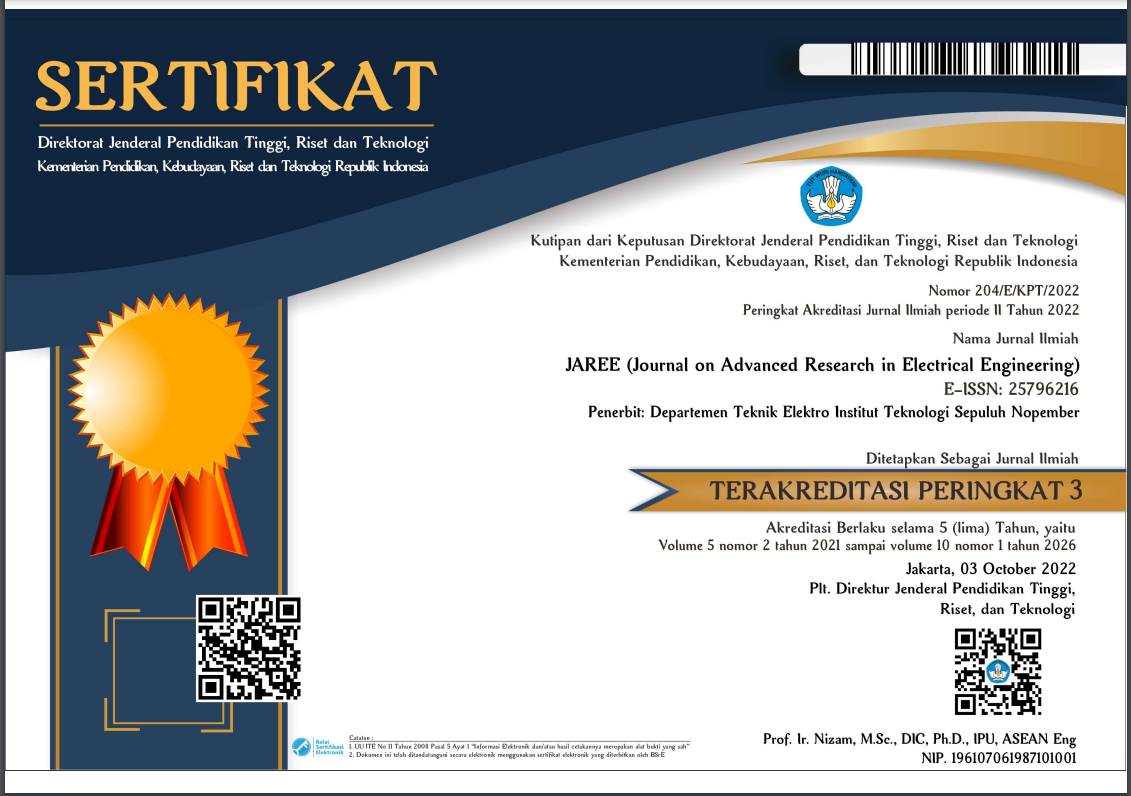Reliable Temperature Measurement in Radiation-Intensive Environments
DOI:
https://doi.org/10.12962/jaree.v8i1.379Abstract
Radiation-resistant temperature sensors are vital for ensuring reliability in radiation-intensive environments, where the highly energetic and penetrating nature of radiation can significantly impact electronic devices and sensors. In such environments, like those near intense radiation sources or in challenging radiation-rich settings, such as space, gamma radiation can lead to erroneous measurements or equipment failures. Radiation-resistant sensors play a crucial role in maintaining measurement accuracy as they are designed to minimize interference caused by radiation, protecting electronic components and providing precise and reliable temperature readings. Their resilience to radiation-induced effects ensures data durability, reducing the need for frequent replacements, and enhancing the overall reliability of measurements in these demanding conditions. In this paper, we present and analyze two different configurations, aiming to address the challenges posed by radiation in sensitive environments. By exploring these novel approaches, we seek to enhance the robustness and accuracy of temperature sensors in radiation-intensive settings, enabling reliable data collection and facilitating successful operations in challenging radiation-rich conditions. The comparative analysis of these configurations will shed light on their performance and effectiveness in mitigating radiation-induced effects, thereby contributing to the advancement of radiation-resistant temperature sensing technologies.References
Tatjana Pešić-Brđanin, “Spice Modelling of Ionizing radiation effects in CMOS Devices†FACTA UNIVERSITATIS Series: Electronics and Energetics Vol. 30, No 2, June 2017, pp. 161 - 178 DOI: 10.2298/FUEE1702161P
Y. H. Lho, K. Y. Kim, “Radiation Effects on the Power MOSFET for Space Applications,†ETRI Journal, vol. 27, no. 4, Aug. 2005, pp. 449-452. DOI: 10.4218/etrij.05.0205.0031
S. Golubovic, S. Dimitrijev, D. Zupac, M. Pejovic and N. Stojadinovic, "Gamma-Radiation Effects in CMOS Transistors," ESSDERC '87: 17th European Solid State Device Research Conference, Bologna, Italy, 1987, pp. 725-728.
Nicolas Roisin, Thibault P. Delhaye, Nicolas André, Jean-Pierre Raskin, Denis Flandre, “Low-power silicon strain sensor based on CMOS current reference topologyâ€, Sensors and Actuators A: Physical, Volume 339, 2022, 113491, ISSN 0924-4247.
C. Viale, P. Petrashin, L. Toledo, W. Lancioni and C. Vazquez, “Single event effects in an analog SOI transconductor: a case studyâ€, 2015 16th Latin-American Test Symposium (LATS), 25-27 March 2015, DOI: 10.1109/LATW.2015.7102408
Felix Kunz, Pablo Petrashin, Gabriela Peretti, Eduardo Romero and Carlos Marqués, “Single-event Transients in OTA-C Analog Structures: A Case Studyâ€. IETE, Journal of research. Volume 57, No 1, January-February 2011, ISSN 0377-2063
S. H. Carbonetto, M. A. GarcÃa-Inza, J. Lipovetzky, E. G. Redin, L. Sambuco Salomone, and A. Faigon, “Zero temperature coefficient bias in MOS devices. dependence on interface traps density, application to MOS dosimetry,†IEEE Trans. Nucl. Sci., vol. 58, no. 6, pp. 3348–3353, 2011.
M. Soubra, J. Cygler, and G. Mackay, “Evaluation of a dual bias dual metal oxide-silicon semiconductor field effect transistor detector as radiation dosimeter,†Med. Phys., vol. 21, no. 4, pp. 567–572, 1994.
J. R. Schwank, M. R. Shaneyfelt, D. M. Fleetwood, et al., “Radiation Effects in MOS Oxides,†IEEE Trans. Nuclear Science, Vol. 55, no. 4, pp. 1833-1853, 2008.
“Temperature compensated low voltage MOSFET radiation sensor: proof of concept and a case study†Pablo Petrashin, Walter Lancioni, Juan Castagnola, AgustÃn Laprovitta. ISSN: 2579-6216 - Journal on Advanced Research in Electrical Engineering, Dec. 2020
“Embedded Radiation Sensor with OBIST Structure for Applications in Mixed Signal Systemsâ€. Pablo Petrashin, Walter Lancioni, Juan Castagnola, AgustÃn Laprovitta. ISSN: 2579-6216 - Journal on Advanced Research in Electrical Engineering, Vol 5, No 2, pp114-119, Sept.2021
O. F. Siebel, M. C. Schneider and C. Galup-Montoro, “Low power and low voltage VT extractor circuit and MOSFET radiation dosimeterâ€, 10th IEEE International NEWCAS Conference, 17-20 June 2012, DOI: 10.1109/NEWCAS.2012.6329016
M.A. Carvajal, S. Garcia-Pareja, M. Vilches, D. Guirado, M. Anguiano, A.J. Palma, A.M. Lallena, “Simulated and experimental angular response of a commercial MOSFET used as dosimeterâ€, Proceedings of the 2009 Spanish Conference on Electron Devices - Feb 11-13, 2009. Santiago de Compostela, Spain.
O.F. Siebel, J.G. Pereira, M.C. Schneider, and C. Galup-Montoro, “A MOSFET dosimeter built on an off-the-shelf component for in vivo radiotherapy applicationsâ€, 2014 IEEE 5th Latin American Symposium on Circuits and Systems 25-28 Feb. 2014, DOI: 10.1109/LASCAS.2014.6820261
M. G. Buehler, B. R. Blaes, G. A. Soli, and G. R. Tardio, “ON-CHIP p-MOSFET DOSIMETRYâ€, IEEE TRANSACTIONS ON NUCLEAR SCIENCE, VOL. 40, NO. 6, DECEMBER 1993
Paul G. A. Jespers “A Simple graphical tool for MOS circuit analysis and design.â€, internal report at Université Catholique de Louvain La Neuve, Belgium
O. F. Siebel, M. C. Schneider and C. Galup-Montoro, “Low power and low voltage VT extractor circuit and MOSFET radiation dosimeterâ€, 10th IEEE International NEWCAS Conference, 17-20 June 2012, DOI: 10.1109/NEWCAS.2012.6329016
M.A. Carvajal, S. Garcia-Pareja, M. Vilches, D. Guirado, M. Anguiano, A.J. Palma, A.M. Lallena, “Simulated and experimental angular response of a commercial MOSFET used as dosimeterâ€, Proceedings of the 2009 Spanish Conference on Electron Devices - Feb 11-13, 2009. Santiago de Compostela, Spain.
O.F. Siebel, J.G. Pereira, M.C. Schneider, and C. Galup-Montoro, “A MOSFET dosimeter built on an off-the-shelf component for in vivo radiotherapy applicationsâ€, 2014 IEEE 5th Latin American Symposium on Circuits and Systems 25-28 Feb. 2014, DOI: 10.1109/LASCAS.2014.6820261








